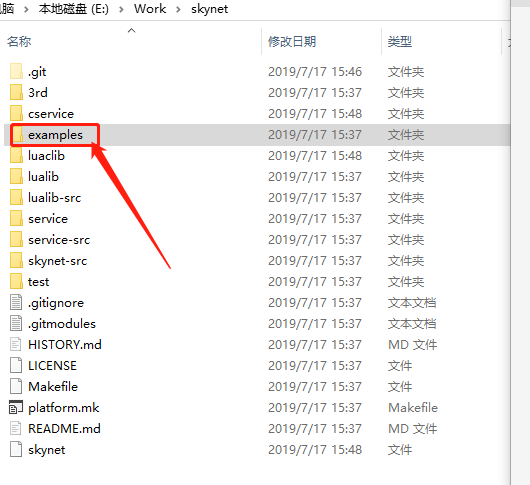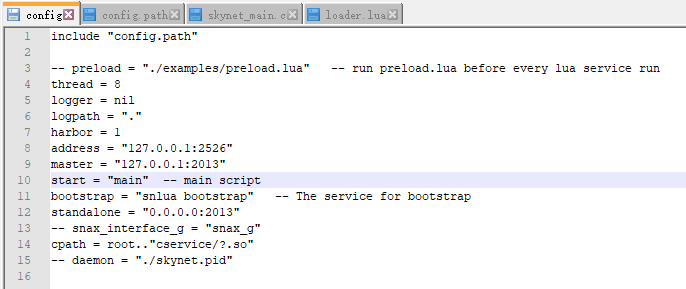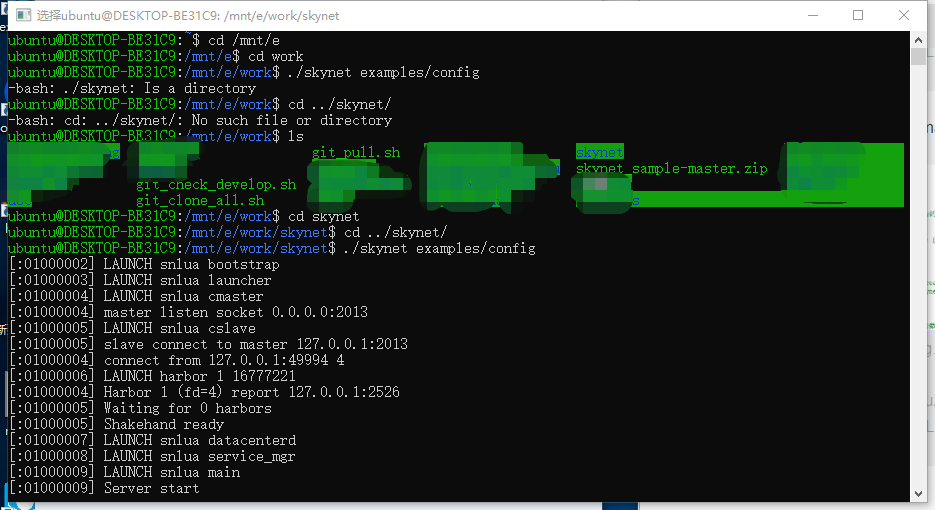Take a look at the skynet basic directory first, as shown below, the sample with skynet is in the examples path
Click in to see config. The following figure shows the configuration information.
The main function of the skynet-src/skynet_main.c script is called here as follows
Start up sample first.
Open the terminal cd to the skynet directory and execute the next line of commands in that directory
cd ../skynet/
Execute the next command
./skynet examples/config
After completion, the following figure is shown as Server start
Then re-open a terminal and re-enter the skynet directory, and execute the following two commands in turn
cd ../skynet/
3rd/lua/lua_examples/client.lua
As shown in the figure below, the helloworld client in the sample starts, and you can see that the service sends a heartbeat packet every five seconds.
If you want to close the server, just Ctrl+C.
Look at the client.lua script again
package.cpath = "luaclib/?.so"
local socket = require "client.socket"
local crypt = require "client.crypt"
if _VERSION ~= "Lua 5.3" then
error "Use lua 5.3"
end
local fd = assert(socket.connect("127.0.0.1", 8001))
local function writeline(fd, text)
socket.send(fd, text .. "\n")
end
local function unpack_line(text)
local from = text:find("\n", 1, true)
if from then
return text:sub(1, from-1), text:sub(from+1)
end
return nil, text
end
local last = ""
local function unpack_f(f)
local function try_recv(fd, last)
local result
result, last = f(last)
if result then
return result, last
end
local r = socket.recv(fd)
if not r then
return nil, last
end
if r == "" then
error "Server closed"
end
return f(last .. r)
end
return function()
while true do
local result
result, last = try_recv(fd, last)
if result then
return result
end
socket.usleep(100)
end
end
end
local readline = unpack_f(unpack_line)
local challenge = crypt.base64decode(readline())
local clientkey = crypt.randomkey()
writeline(fd, crypt.base64encode(crypt.dhexchange(clientkey)))
local secret = crypt.dhsecret(crypt.base64decode(readline()), clientkey)
print("sceret is ", crypt.hexencode(secret))
local hmac = crypt.hmac64(challenge, secret)
writeline(fd, crypt.base64encode(hmac))
local token = {
server = "sample",
user = "hello",
pass = "password",
}
local function encode_token(token)
return string.format("%s@%s:%s",
crypt.base64encode(token.user),
crypt.base64encode(token.server),
crypt.base64encode(token.pass))
end
local etoken = crypt.desencode(secret, encode_token(token))
local b = crypt.base64encode(etoken)
writeline(fd, crypt.base64encode(etoken))
local result = readline()
print(result)
local code = tonumber(string.sub(result, 1, 3))
assert(code == 200)
socket.close(fd)
local subid = crypt.base64decode(string.sub(result, 5))
print("login ok, subid=", subid)
----- connect to game server
local function send_request(v, session)
local size = #v + 4
local package = string.pack(">I2", size)..v..string.pack(">I4", session)
socket.send(fd, package)
return v, session
end
local function recv_response(v)
local size = #v - 5
local content, ok, session = string.unpack("c"..tostring(size).."B>I4", v)
return ok ~=0 , content, session
end
local function unpack_package(text)
local size = #text
if size < 2 then
return nil, text
end
local s = text:byte(1) * 256 + text:byte(2)
if size < s+2 then
return nil, text
end
return text:sub(3,2+s), text:sub(3+s)
end
local readpackage = unpack_f(unpack_package)
local function send_package(fd, pack)
local package = string.pack(">s2", pack)
socket.send(fd, package)
end
local text = "echo"
local index = 1
print("connect")
fd = assert(socket.connect("127.0.0.1", 8888))
last = ""
local handshake = string.format("%s@%s#%s:%d", crypt.base64encode(token.user), crypt.base64encode(token.server),crypt.base64encode(subid) , index)
local hmac = crypt.hmac64(crypt.hashkey(handshake), secret)
send_package(fd, handshake .. ":" .. crypt.base64encode(hmac))
print(readpackage())
print("===>",send_request(text,0))
-- don't recv response
-- print("<===",recv_response(readpackage()))
print("disconnect")
socket.close(fd)
index = index + 1
print("connect again")
fd = assert(socket.connect("127.0.0.1", 8888))
last = ""
local handshake = string.format("%s@%s#%s:%d", crypt.base64encode(token.user), crypt.base64encode(token.server),crypt.base64encode(subid) , index)
local hmac = crypt.hmac64(crypt.hashkey(handshake), secret)
send_package(fd, handshake .. ":" .. crypt.base64encode(hmac))
print(readpackage())
print("===>",send_request("fake",0)) -- request again (use last session 0, so the request message is fake)
print("===>",send_request("again",1)) -- request again (use new session)
print("<===",recv_response(readpackage()))
print("<===",recv_response(readpackage()))
print("disconnect")
socket.close(fd)
pause